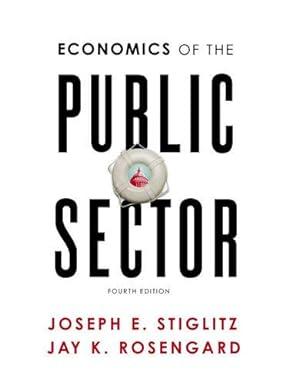One popular voting scheme is rank-order voting, in which individuals assign a rank (1, 2, 3) to
Question:
One popular voting scheme is rank-order voting, in which individuals assign a rank (1, 2, 3) to the possible alternatives; the assigned ranks are then added up, and the alternative with the lowest sum wins. Consider a choice among four alternative ways of spending public funds: a library, a ski slope, a swimming pool, and a garbage dump. Can you construct an example in which the outcome (the most preferred alternative) is, say, a library, if the vote is among the first three alternatives, whereas the outcome is a ski slope, if the vote is among all four alternatives? This voting scheme thus violates the principle that the chosen outcome should be independent of irrelevant outcomes (the garbage dump was not chosen in either situation).
Step by Step Answer:

Economics Of The Public Sector
ISBN: 9780393925227
4th Edition
Authors: Joseph E. Stiglitz, Jay K. Rosengard





